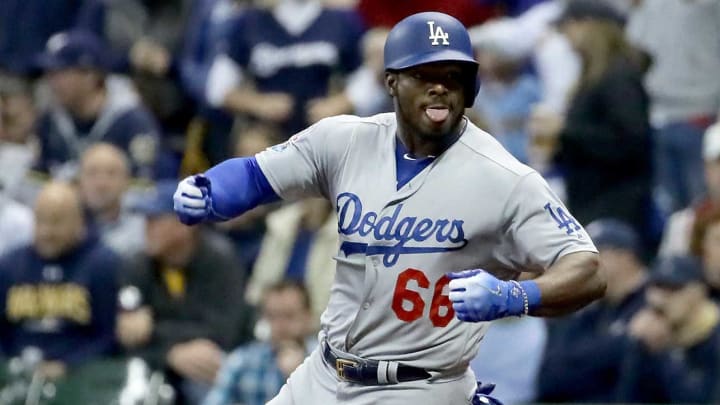Dodgers Coast in Game 7 to Reach Second Straight World Series

Saturday night in Milwaukee brought the first winner-take-all game since the wild-card round—and the winners, the Dodgers, by the score of 5-1, indeed took all. The game was close for a long while, and then it wasn’t. L.A. heads to Fenway for the World Series, a rematch with the Red Sox 102 years in the making, while those plucky Brewers, still searching for their first National League pennant, scatter to the winds until next spring. Three thoughts on the last baseball game til Tuesday…
The Dodger bats ring out again
Both teams struggled to score in this series, but the Dodgers had really struggled to score. Entering Game 7 they had managed all of 18 runs in six games—even the Miami Marlins averaged more than three runs a game in 2018. Every regular other than Chris Taylor and Manny Machado looked diminished at the plate. After leading the National League in homers (en route to leading the NL in scoring), they hit just one in Games 3 through 6. Their woes stemmed in part from the share of their at-bats they were taking against Milwaukee’s lights-out pitchers, yes, but Wade Miley and Freddy Peralta are not Corey Knebel and Josh Hader. The bats had just gone cold.
Red Sox Redemption: David Price Cashes In on First Postseason Win
What the Dodgers did on Saturday night was hit like the Dodgers are supposed to hit. Cody Bellinger scorched a two-run homer off a Jhoulys Chacin meatball in the second, and then, facing Jeremy Jeffress in the sixth with two outs and two men on, Yasiel Puig ripped a gapper that carried all the way over the fence. There’s a maxim of postseason baseball, popularized by my colleague Joe Sheehan: ball go far, team go far. And so it went, with a major assist from the right arm of Walker Buehler. These Dodgers were built on home-run power, and while it abandoned them for much of the NLCS, it came back just in time.
But Jeremy Jeffress let his team down
Before this series began, I wrote that the Brewers would have a shot in this series if and only if Knebel, Hader, Jeffress, and Joakim Soria logged an innings total comparable to that of Milwaukee’s starters. Craig Counsell achieved this balance: Chacin, Gio Gonzalez, and Wade Miley combined for 20 1/3 innings in the NLCS, while Knebel, Hader, Jeffress, and Soria combined for 21 1/3 innings. What went wrong? Knebel and Hader couldn’t have pitched any better, and while Soria struggled, he never cost his team a game. But Jeffress, who functioned as the most closer-like among Milwaukee’s elite relievers, had just an awful series. He tried his damnedest to give away Game 1, allowing three inherited runners to score, and he did give away Game 2, surrendering a game-winning two-run homer to Justin Turner. He loaded the bases in the ninth in Game 3 before Houdiniing his way out of it, and in Game 7 he allowed a single to Justin Turner before throwing his fateful curve to Puig.
It’s Jeffress’s bad luck that all this trouble came when it did, and he had a stellar season that does not deserve to be defined by a bad series (or postseason, really). But the Brewers had unmistakably cast their lot with their three-headed relief monster, and they simply didn’t have the firepower to overcome a functionally missing piece.
Meet the New York Teenager Who Created the 'Mets Are a Good Team' Super PAC
Where does Milwaukee go from here?
A great deal of air was expended this series wondering whether Counsell was managing his team the right way. But after an NLCS in which Counsell pushed mostly the right buttons and it wasn’t enough, the more burning Brewer-related questions would appear to be the ones facing the front office. Why was Milwaukee without a frontline starter who could match Buehler and Clayton Kershaw? Why was the offense so top-heavy? Why was there so much Mike Moustakas?
Let’s not overstate things: this team won 96 games, more than any other NL team, and they were a game away from the World Series. No one should be left grumbling about this season. But the opportunities for meaningful offseason improvement here are obvious—with a lot of hitting and no pitching among their best prospects, they should offer the Mets a fortune for Jacob deGrom or Noah Syndergaard, and they should find a better lefty platoon partner for Ryan Braun than Eric Thames. (Where is Ji-Man Choi when you need him?) They also could use a catcher, all due respect to the bunch they have there. One piece of good news is that, Miley aside, they’re at no risk of losing any piece of the team in free agency. Another is that there’s always a next year, always one more chance to try to get things right.
